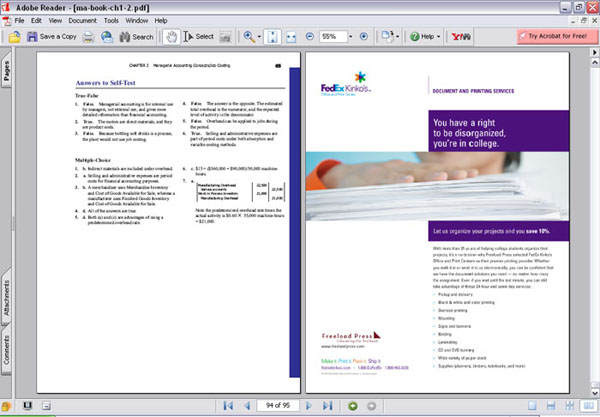The aptly named Freeload Press is giving away free PDFs (free as in free beer, or free market) of over 100 textbooks titles (mostly in business and finance, though more is planned). All students have to do is fill out an online survey and then the download is theirs, to use on a computer or to print out. Where does the money come from? Ads. Ads in the pages of the textbooks.

An ad for FedEx Kinkos in a sample Freeload textbook. Hmmm, wonder where I should get this thing printed?
Ads in textbooks is undoubtedly a depressing thought. Even more depressing, though, is the outlandish cost of textbooks, and the devious, often unethical, ways that textbook publishers seek to thwart the used book market. This Washington Post story gives a quick overview of the problem, and profiles the St. Paul, Minnesota-based Freeload.
Though making textbooks free to students is an admirable aim, simply shifting the cost to advertisers is not a good long-term solution, further eroding as it does the already much-diminished borderline between business and education (I suppose, though, that ads in business ed. textbooks in some ways enact the underlying precepts being taught). There are far better ideas out there for, as Freeload promises, “liberating the textbook” (a slogan that conjures the Cheney-esque: the textbooks will greet us as liberators).
One of them comes from Adrian Lopez Denis, a PhD candidate in Latin American history at UCLA. I’m reproducing a substantial chunk of a brilliant comment he posted last month to the Chronicle of Higher Ed’s Wired Campus blog in response to their coverage of our announcement of MediaCommons. We just met with Adrian while in Los Angeles and will likely be collaborating with him on a project based on the ideas below. Basically, his point is that teachers and students should collaborate on the production of textbooks.
Students are expected to produce a certain amount of pages that educators are supposed to read and grade. There is a great deal of redundancy and waste involved in this practice. Usually several students answer the same questions or write separately on the same topic, and the valuable time of the professionals that read these essays is wasted on a rather repetitive task.
[…]
As long as essay writing remains purely an academic exercise, or an evaluation tool, students would be learning a deep lesson in intellectual futility along with whatever other information the course itself is trying to convey. Assuming that each student is writing 10 pages for a given class, and each class has an average of 50 students, every course is in fact generating 500 pages of written material that would eventually find its way to the campus trashcans. In the meantime, the price of college textbooks is raising four times faster that the general inflation rate.
The solution to this conundrum is rather simple. Small teams of students should be the main producers of course material and every class should operate as a workshop for the collective assemblage of copyright-free instructional tools. Because each team would be working on a different problem, single copies of library materials placed on reserve could become the main source of raw information. Each assignment would generate a handful of multimedia modular units that could be used as building blocks to assemble larger teaching resources. Under this principle, each cohort of students would inherit some course material from their predecessors and contribute to it by adding new units or perfecting what is already there. Courses could evolve, expand, or even branch out. Although centered on the modular production of textbooks and anthologies, this concept could be extended to the creation of syllabi, handouts, slideshows, quizzes, webcasts, and much more. Educators would be involved in helping students to improve their writing rather than simply using the essays to gauge their individual performance. Students would be encouraged to collaborate rather than to compete, and could learn valuable lessons regarding the real nature and ultimate purpose of academic writing and scholarly research.
Online collaboration and electronic publishing of course materials would multiply the potential impact of this approach.
What’s really needed is for textbooks to liberated from textbook publishers. Let schools produce their own knowledge, and spread the wealth.
